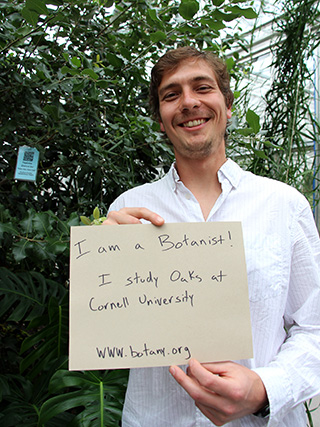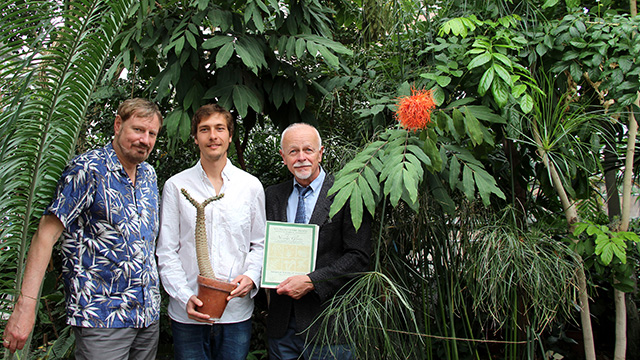
Originally posted in Discovery that Connects (SIPS blog) [2017-04-14]
Plant Sciences major Nicolas Glynos ’17 has received a Young Botanist Award by the Botanical Society of America. The award recognizes outstanding graduating seniors in the plant sciences nationwide.
“It’s a very prestigious honor,” says Karl Niklas, Liberty Hyde Bailey Professor in the Plant Biology Section who nominated Glynos. “This year, only 13 students met all of the award’s criteria.”
Glynos transferred to Cornell in spring semester 2016, after earning and Associate of Science degree at Flathead Valley Community College in Montana. In addition to his stellar performance in the classroom, Glynos distinguished himself at Cornell through his many other plant science activities.
Last summer, he earned a coveted spot on a Smithsonian Research Experience for Undergraduates in Panama, where he studied how heavy-metal toxicity affects rain forest tree growth and reproduction.
Back on campus in fall, Glynos worked part time at the Liberty Hyde Bailey Hortorium, measuring, imaging and data-basing plant specimens and geo-referencing them on digital maps. And he worked on his senior thesis with Kevin Nixon, Professor in the Plant Biology Section and the Hortorium’s curator, studying the varied morphology of oaks to better understand how they adapt to climate change from an evolutionary perspective.
And when a Titan arum – the species that produces the largest inflorescence in the plant world – flowered in the Liberty Hyde Bailey Conservatory for the first time, Glynos volunteered for hours to help explain the fascinating pollination strategy of this plant to the hundreds of visitors who lined up to see it firsthand.
This summer, with help from a grant from the Fredric N. Gabler ’93 Memorial Research Endowment, Glynos will pack up the car for a trip across the western United States to collect and photograph oaks to provide additional data for his senior thesis.
Glynos is on track to complete his B.S. requirements this fall. After that, he plans to study systematics, evolution, and diversity of tropical plants at the graduate level.



